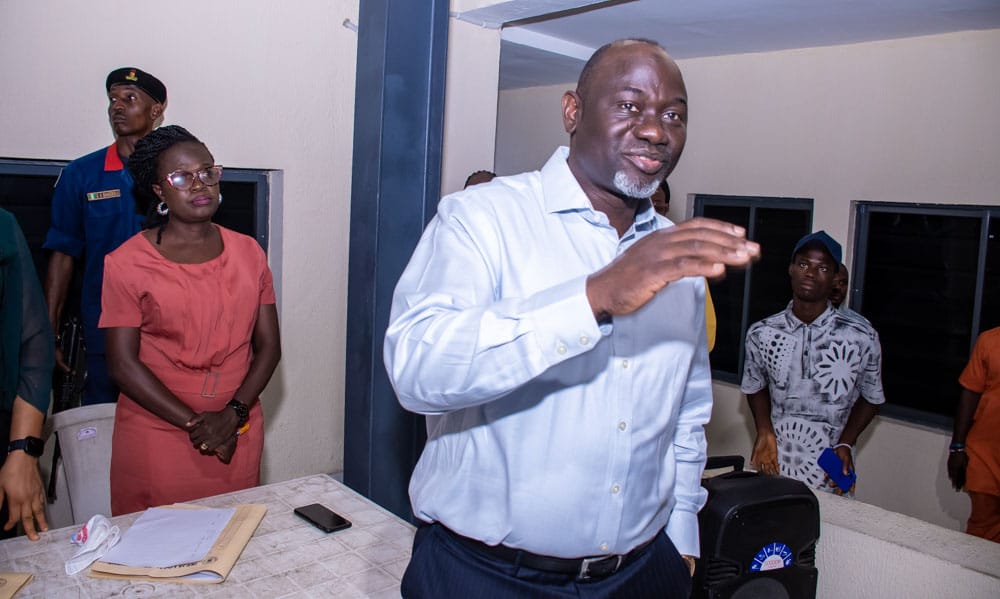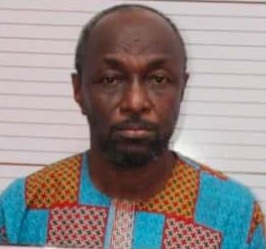In a case that has gripped the attention of Ado-Ekiti residents, 32-year-old technician Mr. Olowoyeye Kayode found himself before the Chief Magistrates’ Court on Tuesday, August 26, 2025, facing serious charges of conspiring to destroy and steal property valued at over N1.6 million from Olart Hotel in the Adebayo area of the Ekiti State capital. The allegations, which include damaging high-value equipment and stealing critical components, paint a picture of a calculated scheme involving Kayode, an accomplice still at large, and another suspect, Mr. Komolafe Ojo, who is already undergoing trial. As the court proceedings unfold, the case raises questions about trust, accountability, and the economic impact of such crimes on local businesses. With the next hearing scheduled for September 22, 2025, this article delves into the details of the case, its implications for the community, and the broader context of crime in Nigeria’s hospitality sector.
The Allegations: A Costly Betrayal
The charges against Olowoyeye Kayode stem from an incident alleged to have occurred on March 12, 2024, at Olart Hotel, a well-known establishment in Ado-Ekiti’s Adebayo area. According to the prosecution, led by Inspector Olubu Apata, Kayode, a technician hired to repair air conditioners and refrigerators at the hotel, conspired with two others—Komolafe Ojo and an accomplice who remains at large—to perpetrate a series of destructive and larcenous acts. The accusations are twofold: malicious damage to hotel property and theft, with the total financial impact exceeding N1.6 million.
Inspector Apata detailed the extent of the alleged damage, which targeted critical equipment essential to the hotel’s operations. The prosecution claims Kayode and his accomplices damaged an air conditioner valued at N250,000, four compressor engines worth N480,000, a chiller fridge estimated at N550,000, and a collection of refrigeration units—including two large fridges and two smaller ones—valued at N400,000. The cumulative cost of the damaged property, totaling over N1.6 million, represents a significant financial blow to Olart Hotel, a business that relies on functional equipment to provide quality services to its guests.
In addition to the destruction, the prosecution alleges that Kayode and his accomplices stole several high-value items, including four compressor engines worth N480,000 and an air conditioning compressor valued at N250,000. These items, belonging to the hotel’s owner, Mr. Adeoye Olumide, were critical components of the hotel’s cooling systems, and their theft further compounded the financial and operational impact on the business. The total value of the stolen property is estimated at N730,000, bringing the combined cost of the alleged crimes to a staggering N2.33 million.
The charges, which violate Sections 304 and 295 of the Criminal Law of Ekiti State, 2021, carry significant penalties under Section 302. Inspector Apata emphasized the severity of the offenses, noting that they not only caused substantial financial loss but also undermined trust in the hospitality sector, where service providers like technicians are often granted access to sensitive equipment. To ensure a thorough presentation of the case, the prosecutor requested an adjournment to review the case file and prepare witnesses, a move that signals the complexity of the allegations and the need for a robust evidential foundation.
The Defendant’s Response: A Plea of Innocence
In a courtroom packed with onlookers, Olowoyeye Kayode entered a plea of not guilty to all charges, setting the stage for a contentious legal battle. Represented by his lawyer, Mr. Olawumi Olowolafe, Kayode maintained his innocence, denying any involvement in the alleged conspiracy, destruction, or theft. His defense team wasted no time in addressing the court, with Olowolafe requesting bail to allow Kayode to prepare for his defense outside of custody.
Olowolafe argued that his client posed no flight risk and was committed to facing the charges head-on. “My client is a responsible individual who will not evade trial,” he assured the court, emphasizing Kayode’s ties to the community and his willingness to cooperate with the judicial process. The defense’s confidence in securing bail reflects a strategy to portray Kayode as a law-abiding citizen caught in a misunderstanding, rather than a deliberate perpetrator of criminal acts.
Chief Magistrate Mrs. Taiwo Ajibade, presiding over the case, granted Kayode’s bail request, setting the amount at N50,000 with one surety of the same value. The relatively modest bail sum suggests the court’s willingness to allow Kayode to remain at liberty while the case progresses, provided he meets the conditions. However, the magistrate adjourned the case until September 22, 2025, giving both the prosecution and defense ample time to prepare their arguments and evidence. The adjournment also reflects the court’s recognition of the case’s complexity, given the involvement of multiple suspects and the significant financial stakes.
The Broader Context: Crime in Nigeria’s Hospitality Sector
The allegations against Kayode and his accomplices highlight a growing concern in Nigeria’s hospitality sector: the vulnerability of businesses to internal and external threats. Hotels, guesthouses, and other service-oriented establishments rely heavily on equipment such as air conditioners, refrigerators, and chillers to provide a comfortable experience for guests. The destruction or theft of such equipment can have devastating consequences, not only in terms of financial loss but also in damage to reputation and operational capacity.
Olart Hotel, located in the bustling Adebayo area of Ado-Ekiti, is a case in point. As a business catering to both local and visiting clientele, the hotel depends on its ability to maintain a high standard of service. The alleged damage to critical cooling systems and the theft of valuable components could disrupt operations, deter guests, and erode trust in the establishment. For the hotel’s owner, Mr. Adeoye Olumide, the financial impact of over N2.3 million in losses is a significant setback, particularly in an economic climate marked by high inflation and rising operational costs.
The case also raises questions about the vetting and oversight of service providers in the hospitality sector. Kayode, employed as a technician to repair air conditioners and refrigerators, was entrusted with access to sensitive equipment, a role that requires a high degree of trust. The allegations that he conspired to damage and steal this equipment underscore the risks businesses face when hiring external contractors or employees. In response, industry stakeholders are likely to call for stricter background checks, enhanced security measures, and greater accountability for service providers to prevent similar incidents in the future.
Economic and Social Implications
The financial toll of the alleged crimes extends beyond Olart Hotel to the broader Ado-Ekiti community. The hospitality sector is a key driver of economic activity in Ekiti State, providing jobs, supporting local businesses, and attracting visitors. Incidents of property damage and theft can undermine the sector’s growth, discouraging investment and eroding consumer confidence. For small and medium-sized enterprises like Olart Hotel, such losses can be particularly devastating, as they often lack the financial reserves to absorb significant setbacks.
Moreover, the case reflects broader challenges in Nigeria’s economic environment. Inflation, which has exceeded 30 percent in 2025, has driven up the cost of equipment, repairs, and operations for businesses. The alleged destruction of assets worth over N1.6 million and the theft of components valued at N730,000 represent a significant loss in a context where replacement costs are likely to be even higher due to inflationary pressures. For Olart Hotel, the financial impact could translate into reduced profitability, delayed expansion plans, or even layoffs, affecting employees and their families.
Socially, the case highlights the issue of trust in professional relationships. Technicians, contractors, and other service providers play a critical role in maintaining the infrastructure of businesses like hotels. When that trust is betrayed, it can lead to a breakdown in community ties and a sense of insecurity among business owners. The fact that Kayode has no fixed address, as noted by the prosecution, may further fuel concerns about accountability and traceability in the hiring process, prompting calls for more robust systems to verify the credentials and reliability of service providers.
Legal and Judicial Considerations
The legal proceedings against Olowoyeye Kayode are being closely watched, not only for their implications for Olart Hotel but also for their potential to set precedents in how similar cases are handled in Ekiti State. The charges, which fall under Sections 304 and 295 of the Criminal Law of Ekiti State, 2021, carry significant penalties under Section 302, reflecting the seriousness with which the state views property crimes. The prosecution’s request for an adjournment to review the case file and prepare witnesses suggests a meticulous approach, likely driven by the need to establish a clear link between Kayode, his alleged accomplice, and the crimes committed.
The involvement of multiple suspects complicates the case. Komolafe Ojo, already undergoing trial, and an accomplice still at large indicate that the alleged crimes may have been part of a broader conspiracy. The prosecution will need to present compelling evidence, including witness testimonies, forensic analysis of the damaged equipment, and documentation of the stolen items, to secure a conviction. For the defense, the challenge will be to counter these allegations, potentially by questioning the evidence or presenting an alternative narrative that absolves Kayode of responsibility.
The granting of bail by Chief Magistrate Mrs. Taiwo Ajibade reflects a balanced approach, allowing Kayode to prepare his defense while ensuring accountability through the surety requirement. However, the adjournment until September 22, 2025, means that the case will linger for over a year, a timeline that may frustrate the hotel owner and other stakeholders seeking swift justice. The delay also underscores the broader challenges in Nigeria’s judicial system, where backlogs and resource constraints often prolong legal proceedings.
Community and Industry Reactions
The case has sparked significant discussion in Ado-Ekiti, with local residents and business owners expressing concern about the vulnerability of small businesses to crime. Hoteliers in the area, in particular, are likely to view the incident as a wake-up call to strengthen security measures and vetting processes. The Ekiti State chapter of the Hoteliers Association of Nigeria may use this case to advocate for greater government support, including enhanced police patrols in commercial areas and policies to protect businesses from property crimes.
For the broader hospitality industry, the incident highlights the need for industry-wide standards to prevent similar occurrences. This could include mandatory training for technicians, certification requirements for service providers, and the adoption of advanced security technologies, such as surveillance cameras and GPS tracking for equipment. Such measures could help restore confidence in the sector and ensure that businesses like Olart Hotel can operate without fear of sabotage or theft.
Looking Ahead: A Case with Far-Reaching Implications
As the case against Olowoyeye Kayode moves toward its next hearing in September 2025, it serves as a microcosm of the challenges facing Nigeria’s hospitality sector and small businesses. The alleged destruction and theft of property worth over N2.3 million highlight the financial and operational risks businesses face in an economically challenging environment. For Olart Hotel, the incident is a costly setback that could take months or even years to recover from, particularly if replacement costs continue to rise.
The case also underscores the importance of trust, accountability, and security in professional relationships. As businesses increasingly rely on external contractors and technicians, incidents like this highlight the need for robust vetting and oversight mechanisms. The outcome of the trial could set important precedents for how property crimes are prosecuted in Ekiti State, potentially influencing future cases and shaping industry practices.
For now, all eyes are on the Ado-Ekiti Chief Magistrates’ Court as it prepares to hear the case in September 2025. The prosecution’s ability to present a compelling case, the defense’s efforts to secure Kayode’s acquittal, and the court’s final ruling will determine the resolution of this high-stakes drama. As Olart Hotel and its owner, Mr. Adeoye Olumide, seek justice, the case serves as a reminder of the resilience required to operate a business in Nigeria’s dynamic and often unpredictable environment.







